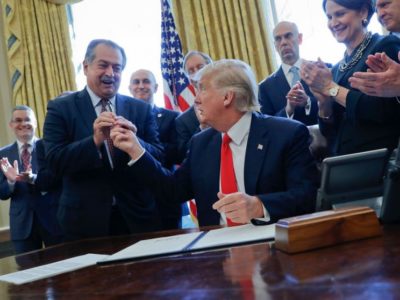Month: February 2017
The End of the Cost-Benefit State?
Trump is targeting regulations for elimination even if their benefits exceed their costs.
Some scholars have proclaimed a vision of the regulatory state centering on cost-benefit analysis (CBA). They mean that quantitive comparisons of costs and benefits is now the foundation of regulatory decisions, arguably blessed by the Supreme Court in one of Scalia’s last opinions. Environmentalists weren’t convinced this was a good idea. Neither, as it turns out, is Donald Trump. He doesn’t seem …
Continue reading “The End of the Cost-Benefit State?”
CONTINUE READINGUnderstanding why California housing costs so much
Is the problem CEQA, local land-use regulations, both or neither?
Housing costs in the Bay Area and Los Angeles continue to get a lot of attention in the press and academic literature. This New York Times article highlights this recent paper from Ed Glaeser at Harvard and Joe Gyourko at Penn – the paper’s analysis concludes that land-use regulations have significantly increased the price of …
Continue reading “Understanding why California housing costs so much”
CONTINUE READINGConservatives as Environmentalists
Environmentalism isn’t an aberration in conservatives. It has deep roots going back to the 1960s.
Scott Pruitt’s appointment as head of EPA illustrates how conservatism has become synonymous with anti-environmentalism. But that’s really a drastic oversimplification, as I explain in a new paper about the history of conservative environmentalism. There were moments of strong environmentalism in the earlier days of the conservative movement. When he was running for mayor of New York City, William …
Continue reading “Conservatives as Environmentalists”
CONTINUE READINGAbout that carbon tax idea….
Eric Biber posted last week about the proposal from several heavyweight Republicans for a carbon tax, outlined in a Wall Street Journal op-ed. Much has been said about the merits and problems of a carbon tax, including on this blog, so I will try not to repeat those points here. However, I wanted to expand …
Continue reading “About that carbon tax idea….”
CONTINUE READINGA Yawning Credibility Gap
Courts are supposed to defer to agencies. But that happens less often when an agency lacks credibility.
Two themes in the Trump Administration are distrust of experts and a willingness to overrule them on ideological grounds. But undermining the government’s claims to expertise may come back to haunt the Administration. Because Trump is marginalizing government scientific and economic expertise, his regulatory initiatives may get less deference from the courts. There is already a great deal of concern …
Continue reading “A Yawning Credibility Gap”
CONTINUE READINGTrump’s Environmental Assault Begins
Clean Power Plan, Waters of the U.S. Rules First on the Chopping Block But What Remains in Place Varies Dramatically
The Washington Post is reporting that the Trump Administration will very shortly roll out two executive orders to curtail environmental protection. These rollbacks follow on the heels of the Senate’s confirmation of Scott Pruitt, who has made no secret of his antipathy for federal environmental regulations. The first executive order, as widely expected, will tell the …
Continue reading “Trump’s Environmental Assault Begins”
CONTINUE READINGPublic Lands Watch: House Joint Resolution 69
House passes resolution to nullify regulation restricting hunting on Alaska National Wildlife Refuges
Additional update: The President signed SJR 69. Update: The Senate just passed S.J.R. 69. The House voted last week to pass House Joint Resolution 69. The resolution disapproves of the Fish & Wildlife Service rule, “Non-Subsistence Take of Wildlife, and Public Participation and Closure Procedures on National Wildlife Refuges in Alaska,” which was finalized on …
Continue reading “Public Lands Watch: House Joint Resolution 69”
CONTINUE READINGThe GOP’s stealth carbon tax?
Republican proposals for border adjustment tax are equivalent to a carbon tax on oil
One of the leading proposals being floated by Republicans for tax reform is what is called a border adjustment tax. Put simply, it would tax corporate income on imports into the U.S. and leave income from exports tax exempt. The policy argument for it is that it would simplify tax administration for large, multinational companies …
Continue reading “The GOP’s stealth carbon tax?”
CONTINUE READINGA conservative proposal for a carbon tax
A promising proposal from conservative leaders, but important questions remain
An impressive lineup of senior Republican leaders has embraced a carbon tax as an approach to address climate change. The proposal is to trade away the Obama Administration Clean Power Plan and tort liability against fossil fuel companies for a $40/ton carbon tax that would increase over time. All revenues from the tax would be …
Continue reading “A conservative proposal for a carbon tax”
CONTINUE READINGIs Texas Cleaning Up Its Act?
Carbon emissions are set in decline in Texas, with less coal and more renewables.
At a national meeting of state utility regulators, the head of the group recently said that the Clean Power Plan was basically dead, BUT this might not matter because “arguably, you’re seeing market-based decarbonization” due to technological changes. Case in point: Texas. Market trends are pushing Republican-stronghold Texas toward a cleaner grid. ERCOT, which operates nearly all …
Continue reading “Is Texas Cleaning Up Its Act?”
CONTINUE READING








